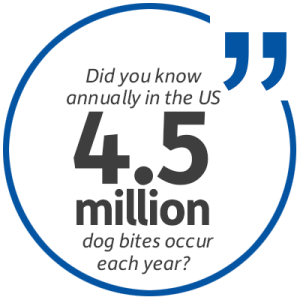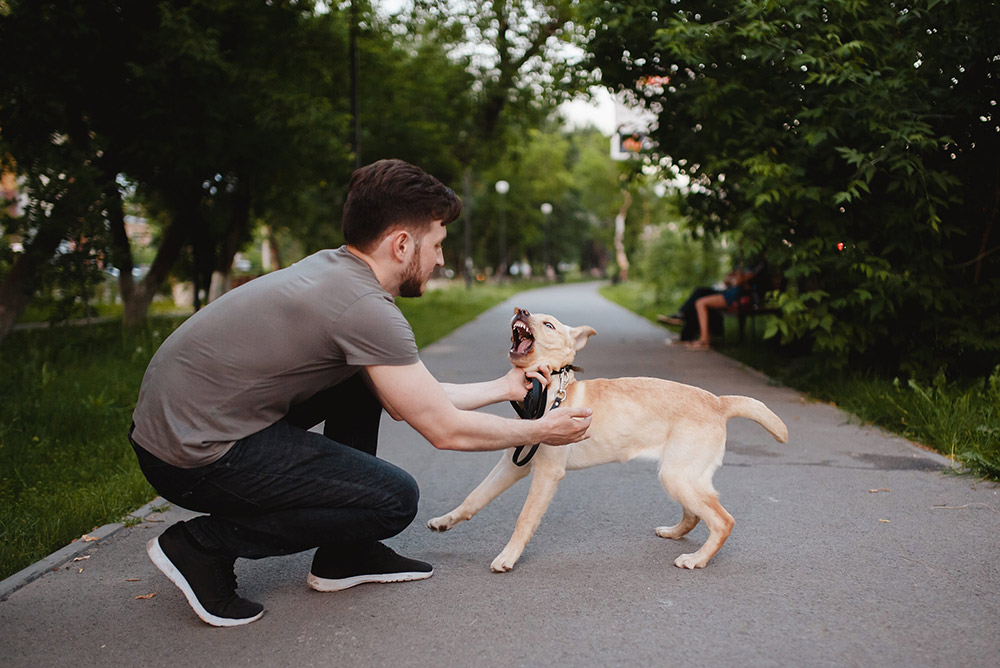It’s tempting to believe that if you don’t need stitches or reconstructive surgery for damaged tissues or nerves after a dog bite that everything is fine, but that may not be the case. An infected dog bite is dangerous, and if left untreated, can be potentially life-threatening.
Dog bite infection symptoms
Whenever a dog’s teeth penetrate the skin, you are at risk for infection. The wound doesn’t have to be large, and you don’t even have to be bleeding a lot for bacteria from the dog’s mouth to enter your body. Another dangerous scenario can occur if you have bacteria on your skin that is deposited deep under the skin when the dog punctures it with its teeth.

A Level 2 dog bite, which may not break the skin, can cause redness and bruising, and Level 3 dog bites, which may involve shallow lacerations or puncture wounds, are particularly common. Level 4 and 5 bites are serious, so a hospital trip is necessary, but people are often confused about what to do in the case of Levels 2 and 3 bites.
Unfortunately, even Level 2 bites can be concerning when it comes to the risk of infections. And in the case of Level 3 bites, even a scratch that breaks the skin carries a danger. In many cases, people are nipped on the hand or fingers when they are reaching out to either pet an unfamiliar dog or (in the case of an attack) protect themselves. Infections on the fingers are especially difficult for the body to fight. Sometimes when the puncture marks are small, a doctor may have to enlarge the wound to adequately wash it out.
Certain conditions can increase the risk of infection:
- Diabetes
- Excessive alcohol use
- Absence of a spleen
- The use of medications (like chemotherapy) that could damage cells
- Any health conditions that affect the immune system
What is a dog bite infection?
This can happen when bacteria from a dog’s mouth enter your body through an open puncture wound, scrape, or cut. The bacteria multiply and then your body’s immune system tries to fight them. Infection symptoms (such as swelling, fever, and redness) are signs of this battle. According to the AAFP (Association of American Family Physicians), about 15%-20% of dog bites become infected.

Considering the fact that there are 4.5 million dog bites each year in the United States, including 800,000 severe enough to require medical treatment, somewhere between 160,000 and 900,000 dog bites become infected annually.
According to information published by The Cleveland Clinic, approximately half of dog bites introduce potentially dangerous bacteria (such as Staphylococcus, Streptococcus, Pasteurella, or Capnocytophaga) into the body through broken skin.
- Pain
- Redness near the bite
- Swelling around the bite
- Flu-like symptoms
- Fever
- Blisters or oozing on or near the wound
- Swollen or inflamed joints
- Headache
- Diarrhea
- Nausea and/or vomiting
- Red streaks near the bite
- Night sweats
Dog bite treatment
If you or your child have been bitten by a dog and the wound is serious, you should head straight to an Urgent Care center or to the Emergency Room. However, what if the bite doesn’t seem serious? You can take steps to head off infection by reacting right away. You can take some immediate steps yourself to ward off infection but should visit a doctor within 8 hours.
You should:
- Use mild soap and continuously running water to wash out the wound. Irrigate the bite site for at least 5-10 minutes.
- Apply an over-the-counter antibiotic cream and wrap the wound in a sterile cloth.
- Visit the doctor as soon as possible, but definitely within 8 hours.
- After your doctor’s visit, change the dressing on your wound several times a day. Follow the instructions of your primary care physician.
Your doctor will:
- Ask for proof that the dog that bit you has been vaccinated against rabies.
- Check when your last tetanus shot was, since you may need a booster.
- Clean and irrigate the wound, apply antibiotic ointment, and prescribe antibiotic ointment for you to use at home.
- Report the dog bite to the local health authority.
- Possibly prescribe a 3-7 day course of oral antibiotics (usually Amoxicillin, Clindamycin, or Doxycycline) as a precaution.
A final note:
It’s important to take all dog bites seriously, even the ones that don’t seem catastrophic at the time they occur. Because there is so much potential for complications down the line and the necessity for time away from work, you may be in financial difficulties as a result of an infection after a dog bite.
The cost of medications and the expenses for doctor or hospital visits can rapidly add up, so you need to consult with an experienced Indiana dog bite attorney. If you make a claim to be compensated for all of your medical expenses, you may find yourself battling a reluctant insurance company. Just remember that you are not hurting the negligent dog owner (let’s be honest, the dog owner may be a friend). Instead, you are negotiating with the insurance company for the money you need after your dog bite injury. Whether your friend or acquaintance with the snappy dog has dog bite insurance or just regular homeowner’s insurance, your lawyer will work to negotiate a fair settlement.
At Crossen Law Firm, we can work to make sure that you receive financial compensation for your economic and noneconomic losses after an infected dog bite. We will be able to determine if the dog owner was negligent or acted recklessly. We will also deal with the relevant insurance company so you don’t have to worry while recuperating.
Our Indianapolis personal injury lawyers at Crossen Law Firm have decades of experience handling all kinds of claims, including dog bites.
To schedule a free consultation with one of our reputable Indianapolis dog bite lawyers, dial (317) 401-8626 now or contact us online.

 317-401-8626
317-401-8626 
.jpg)